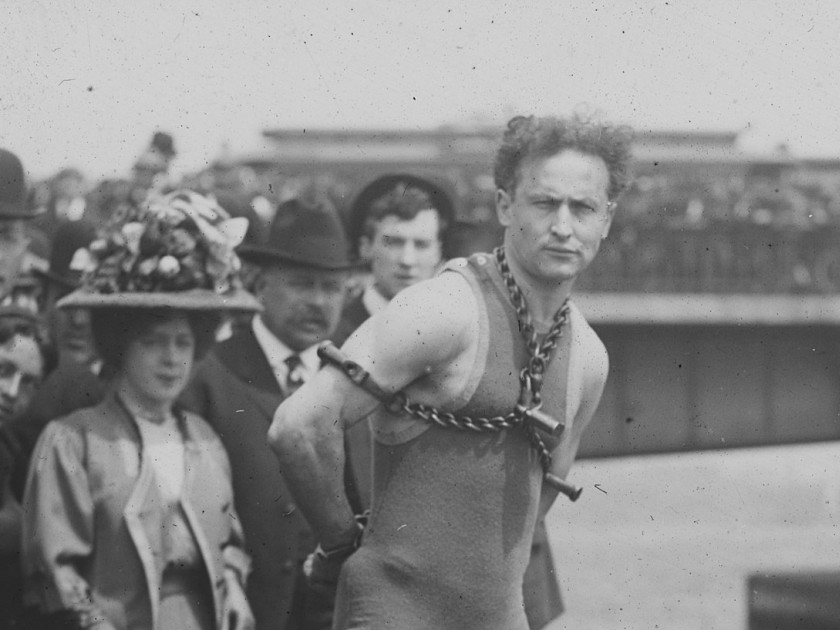Join a community of readers who are committed to Jewish stories
Sign up for JBC’s Nu Reads, a curated selection of Jewish books delivered straight to your door!

Houdini jumps from Harvard Bridge, Boston, Massachusetts
Photo by John H. Thurston, 1908, Library of Congress
The most famous magician of all time is, unquestionably, Harry Houdini. The most famous living magicians are David Copperfield and David Blaine. If you asked any magician who the greatest “coin” magician is, that’s another easy one: David Roth. And if you were seeking the world’s most celebrated living mind reader, most would point you to Max Maven.
Jewish people make up just 2 percent of the American public, and 0.02 percent of the world. Nevertheless, an overwhelming number of magic luminaries — including all those mentioned above — identify as Jewish or are of Jewish descent. Why?
This question is one that comes up often as I make my way across the country, lecturing and performing magic at Jewish institutions in support of my new book, How Magicians Think. Let me try to answer it in two ways.
First, magic was an accessible profession at the dawn of magic’s so-called “Golden Age,” from 1880 to 1930. As vaudeville emerged, there was a seemingly endless need for quality acts, and many recent Jewish immigrants saw magic as their shot on the big stages of the world. Many managers and theater impresarios were Jewish, and much of the magic industry was accepting of Jews at a time when many other professions were closed off to them. In many of their ancestral countries, Jewish people weren’t even allowed to own land, let alone be part of trade schools or work forces. Magic provided a refreshing alternative: the only thing that becoming a master magician requires is a prodigious amount of practice. Jewish families have, historically, put an emphasis on learning and hard work, and these are the two sterling qualities that magicians require to achieve mastery.
As vaudeville emerged, there was a seemingly endless need for quality acts, and many recent Jewish immigrants saw magic as their shot on the big stages of the world.
The closeness of the Jewish community reminds me in many ways of the magic community itself. Magicians are known as an insular group — a result of maintaining the secrecy integral to our field. But among each other, magicians are actually an extremely warm, welcoming, social community, and one that has embraced Jewish performers with open arms. It’s a self-perpetuating cycle, too. When young Jewish children saw The Great Lafayette, Houdini, and Horace Goldin in the bright vaudeville lights, they did what all little kids do at magic shows: they dreamed of beingonstage themselves, making magic.
My second thought is of a more personal nature. It’s my observation that, in addition to appreciating intellectual pursuits and rigorous discussion, many Jewish families value entertainment in a way that not all do. Magic is, to me, the most intellectual of all the performing arts because it is unsolvable, and perhaps unknowable.
My parents made no ultimatums about what I ought to do with my life, and they didn’t scoff at my attraction to magic. Rather, they encouragedme, as an eight-year-old kid, to sharpen my skills and continue practicing. I now run a youth magic program and deal with many parents who can’t see the value in it. They would rather their child play baseball or chess or spend more time preparing for a career in law. My parents (and those of the many Jewish magicians I’ve studied) were more open-minded. Perhaps we should recognize that the world could use a little more magic … and a few less lawyers.
Joshua Jay has performed on stages in more than 100 countries. He is a headliner at Hollywood’s Magic Castle and a former World Champion in Sleight-of-Hand. He is the author of MAGIC: The Complete Course and, for children, Big Magic for Little Hands. He consulted on illusions for Game of Thrones and helped the US Postal Service with their “Art of Magic” postage stamps. Joshua has performed on The Tonight Show with Jimmy Fallon, The Late Show with James Corden, and he fooled Penn & Teller on their hit show, Fool Us, and he starred in his own off-Broadway magic show, Six Impossible Things.